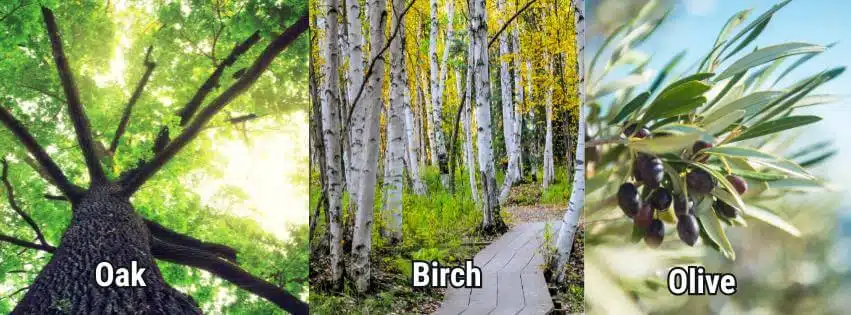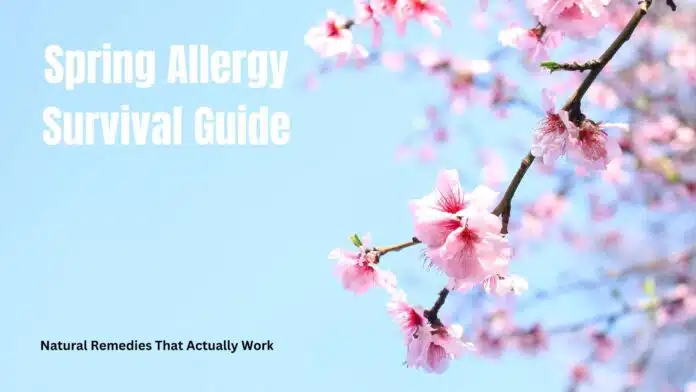Spring Allergy Survival Guide: When spring arrives every year, we see nature come back to life. However, for many, it also means the beginning of allergy season. Knowing what triggers these spring allergies is the first step in reducing symptoms and genuinely enjoying the season’s beauty.
What Causes Spring Allergies?
Spring allergies often occur because plants release pollen as they bloom. Tiny particles are sent into the air when flowers, trees, and grasses pollinate. For people who are sensitive to these seasonal changes, their bodies wrongly see pollen as a threat, which causes an exaggerated reaction. This response can lead to sneezing, stuffy noses, itchy eyes, and more, especially during the peak of spring allergy season.
Statistics: The Impact of Spring Allergies in Europe
- Approximately 40% of Europeans suffer from hay fever, with tree and grass pollens being the primary culprits (European Respiratory Society).
- Studies show that pollen seasons are lengthening, with some regions experiencing symptoms two to three weeks earlier than a decade ago (Nature Climate Change, 2022).
- According to a European Academy of Allergy and Clinical Immunology (EAACI) survey, up to 30% of allergy sufferers report trying natural remedies.
Expert Recommendations: What the Doctors Say
Medical professionals and local health experts offer valuable insights and practical advice.
“Understanding your environment is the first step,”
says Dr. Maria Schmidt, an allergist based in Munich
“Many of my patients are surprised by how different pollen seasons can be compared to their home countries. Knowing what you’re reacting to—whether it’s birch pollen in northern Europe or olive tree pollen in the south—can make all the difference in selecting the right remedies.”
says Dr. Maria Schmidt, an allergist based in Munich
Dr. Schmidt also emphasizes the importance of consistent management. “It’s not just about reacting when symptoms flare up,” she notes. “Taking a proactive approach—like starting natural remedies early in the season—can help keep symptoms under control.”
Insights from Dr. Jane Doe, Allergist
Dr Jane Doe, a leading allergist, advises starting allergy treatments early. “By taking preventive steps—such as using natural remedies and monitoring pollen counts—you can minimize symptoms before they escalate,” she explains. Dr. Doe also emphasizes the importance of consistent, long-term management.
Tips from Local Health Experts
In many European countries, pharmacies and health clinics provide seasonal allergy advice. Local practitioners often recommend combining lifestyle adjustments with natural and conventional treatments for comprehensive relief.
Recognizing Local Pollen Sources in Europe
Europe’s diverse flora means allergy triggers vary by location. Knowing what grows in your region—and when it blooms—can help you avoid symptoms.
Common Trees, Grasses, and Weeds

Trees: Birch, oak, and olive trees are major spring pollen producers across northern and southern Europe.
Grasses: Ryegrass and timothy grass peak during spring, causing widespread discomfort.
Weeds: Ragweed often starts blooming in late spring and persists into early summer.
Effective Natural Remedies for Spring Allergy
Natural methods can work well alongside medical treatments, providing a softer way to help manage symptoms.
Local Honey: A Sweet Solution
Some believe that eating small amounts of local honey helps build tolerance to regional pollen. The idea is that exposure to tiny amounts of the allergen may lessen sensitivity over time. While scientific backing is mixed, many people report anecdotal benefits.
Herbal Teas and Infusions
Chamomile, nettle, and peppermint teas may help soothe irritated sinuses and reduce inflammation. Drinking these warm infusions can provide comforting relief.
Essential Oils and Aromatherapy
Using essential oils such as eucalyptus or lavender in a diffuser may ease nasal congestion. Adding a few drops to a warm bath or inhaling steam infused with these oils can promote clearer breathing.
Saline Nasal Rinses
Rinsing your nasal passages with saline helps flush out pollen and allergens. This simple practice can reduce nasal irritation and help you breathe more easily.
Expats and Newcomers: Adapting to European Allergy Challenges
Adjusting to a new region means learning to manage unfamiliar pollen sources and seeking support in the community.
Understanding Cultural Differences in Allergy Management
Cultural approaches to allergy management vary across Europe. While some regions rely heavily on herbal remedies, others emphasize preventive measures and regular consultation with local doctors.
Community Resources and Support Groups
Local expat groups, community centres, and online forums can connect you with others experiencing similar issues. Sharing tips, recommendations, and even local pollen reports can help you feel more prepared and less isolated.
Research Links: Where to Find Reliable Information
To dive deeper into these natural approaches and get credible medical advice, consult the following sources:
- The European Academy of Allergy and Clinical Immunology (EAACI) https://www.eaaci.org/
- Nature Climate Change’s findings on pollen season length. https://www.nature.com/articles/s41598-024-53996-z
- The European Respiratory Society’s guidelines https://erj.ersjournals.com/
- Studies on probiotics and allergy relief in the Journal of Allergy and Clinical Immunology https://www.jacionline.org/
Final Thoughts on Natural Remedies
Natural remedies can help manage spring allergies, especially with good planning. Simple things like local honey, herbal teas, and essential oils can relieve allergy symptoms while supporting overall health.
Encouragement to Explore and Enjoy the Season
Spring is a time for new beginnings and growth. To make the most of this lovely season filled with colourful flowers and sunny skies, it’s essential to know what to expect. By staying updated on what’s happening around you, getting help from knowledgeable people, and trying simple natural solutions, you can be prepared for any challenges that come your way and fully enjoy everything spring has to offer.

